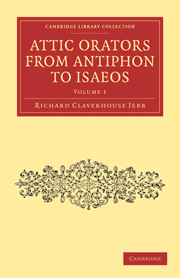Book contents
- Frontmatter
- PREFACE
- EDITIONS AND AUTHORITIES
- Contents
- CORRIGENDA
- ANNALS
- INTRODUCTION
- CHAPTER I ANTIPHON.—LIFE
- CHAPTER II ANTIPHON.—STYLE
- CHAPTER III ANTIPHON.—WORKS
- CHAPTER IV ANDOKIDES.—LIFE
- CHAPTER V ANDOKIDES.—STYLE
- CHAPTER VI ANDOKIDES.—WORKS
- CHAPTER VII LYSIAS.—LIFE
- CHAPTER VIII LYSIAS.—STYLE
- CHAPTER IX LYSIAS.—WORKS
- CHAPTER X LYSIAS.—WORKS
- CHAPTER XI LYSIAS.—WORKS
CHAPTER IX - LYSIAS.—WORKS
THE EXTANT COLLECTION.—EPIDEICTIC AND DELIBERATIVE SPEECHES
Published online by Cambridge University Press: 05 October 2010
- Frontmatter
- PREFACE
- EDITIONS AND AUTHORITIES
- Contents
- CORRIGENDA
- ANNALS
- INTRODUCTION
- CHAPTER I ANTIPHON.—LIFE
- CHAPTER II ANTIPHON.—STYLE
- CHAPTER III ANTIPHON.—WORKS
- CHAPTER IV ANDOKIDES.—LIFE
- CHAPTER V ANDOKIDES.—STYLE
- CHAPTER VI ANDOKIDES.—WORKS
- CHAPTER VII LYSIAS.—LIFE
- CHAPTER VIII LYSIAS.—STYLE
- CHAPTER IX LYSIAS.—WORKS
- CHAPTER X LYSIAS.—WORKS
- CHAPTER XI LYSIAS.—WORKS
Summary
THE EXTANT COLLECTION.—EPIDEICTIC AND DELIBERATIVE SPEECHES
The Plutarchic biographer of Lysias says:—‘425 compositions pass under his name; of which 233 are pronounced genuine by Dionysios and Caecilius’. The precise number 233 was probably given by Dionysios or Caecilius, not by both; but it may be taken as representing roughly the proportion of genuine to spurious allowed by the Augustan Atticists. It is not difficult to understand how the list of works attributed to Lysias had become so large and so inaccurate. His fertility was known to have been great; his style was distinguished less by any salient features than by marks needing for their recognition a finer sense, especially an instinct for the niceties of Attic idiom; and it was not until the Attic revival under Augustus that such an instinct, dead during two centuries, was brought back to an artificial life. Meanwhile the grammarians of Pergamos and Alexandria, presuming on the reputation of Lysias for industry, had probably been lavish in ascribing to him such anonymous forensic speeches as bore the general stamp of the ‘plain’ style.
Proportion of Extant to Lost Works
Thirty-four speeches, entire, or represented by large fragments, are extant under the name of Lysias. A hundred and twenty-seven lost speeches are known from smaller fragments or by their titles. Three letters, cited by grammarians, are identified by the names of the persons to whom they were addressed. If to this list is added the disputed Erôtikos in Plato's Phaedros, 165 of the 425 compositions mentioned in the Plutarchic Life have been accounted for; 260 remain unknown.
- Type
- Chapter
- Information
- Attic Orators from Antiphon to Isaeos , pp. 199 - 212Publisher: Cambridge University PressPrint publication year: 2010



